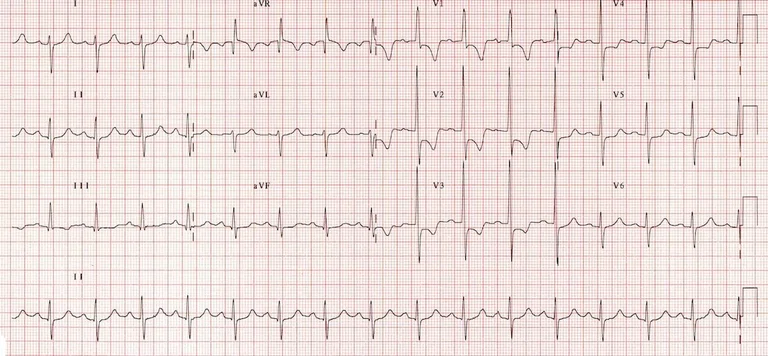FROM OUR TEAMS
EKG Puzzler
Try out this expert-level EKG Puzzler! Email us and let us know what you think the answer is!
Try out this expert-level EKG Puzzler! Email us and let us know what you think the answer is!
1 MIN READ


Q1. What are the problems with this 12-Lead?
Q1. What are the problems with this 12-Lead?
Q2. What are possible non valvular causes of said problems?
Q2. What are possible non valvular causes of said problems?
Here’s the answer from the last issue’s EKG Puzzler.
Q: When a patient has slow, wide QRS complex 3rd degree Heartblock, Atropine may be administered to try and increase the ventricular rate, but may not be effective. Why? What other drugs/interventions could be considered?
A: Atropine is an anticholinergic drug which blocks parasympathetic nervous system activity. A wide QRS Complex 3rd degree heart block indicates that the block is anatomically low (possibly in the ventricles) and the parasympathetic nervous system does not innervate the ventricles. Consider Epinephrine, Dopamine, or possible transcutaneous pacing depending on patient condition.
Good luck! We look forward to hearing your answers!
Related Articles

FROM OUR TEAMS
The Importance of Patient Satisfaction at the Bedside

FROM OUR TEAMS
Patient Safety, Satisfaction, and the UAA
Contact us at CNREPHelp@houstonmethodist.org
Questions or comments?


In this
issue

WELCOME
NURSING SCIENCE
EDUCATION
PRACTICE

Does Using the "4M's Framework: What Matters Most" Improve Patient Satisfaction?

Mary E. Mahoney Simulation Center
PROFESSIONAL DEVELOPMENT
FROM OUR TEAMS

EKG Puzzler

The Importance of Patient Satisfaction at the Bedside

PCA Academy

Patient Safety, Satisfaction & the UAA

ABOUT DISCOVERN








